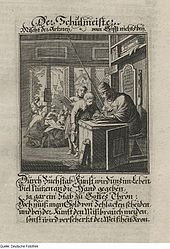Schoolmaster


As a schoolmaster were designated teachers to rural schools and elementary schools in the cities ( elementary schools , civic schools). A formal teaching qualification was not required for a long time; usually the sufficient school patron demonstration lessons or other aptitude tests for employment of the applicant.
history

Often the office of schoolmaster, which has been documented since the Middle Ages, was connected with the sexton at the local church or with the organist position. In Mecklenburg , therefore, traditionally the terms “schoolmaster” (Niederdt. Schaulmeister ), “teacher” ( Lihrer ) and “Küster” ( Köster ) were used in the same word meaning.
A schoolmaster was not infrequently the only teacher at a one-class village school and had to complete the entire quota of knowledge transfer, in which religion , reading and writing as well as arithmetic dominated.
Since the end of the 18th century, private or state seminars for teachers have been set up in various locations , at which schoolmasters were taught the tools they need to practice their profession.
As a janitor compulsory education in Saxony-Gotha were called the schoolmaster in 1642 after the introduction, often worked as organist and / or cantors.
reception
In his fable The Child and the Schoolmaster (1668) as well as in The Schoolboy, the School Fox and the Garden Owner (1679), Jean de La Fontaine satirically targeting the title figure, who is literally a schoolmaster.
In 1790 Jean Paul wrote the story Life of the cheerful schoolmaster Maria Wutz in Auenthal .
Wilhelm Raabe's novella From the life book of the schoolmaster Michel Haas was written in the summer of 1859.
Rudolf Tarnow set a literary monument to a Mecklenburg schoolmaster in “Köster Klickermann” .
Felix Stillfried described in his novel De Wilhelmshäger Kösterlüd the life stories of three generations of teachers in Mecklenburg (1887).
One of the most famous musical works about a schoolmaster is Christoph Ludwig Fehres cantata Der Schulmeister in der Singschule (1751), which was ascribed to Georg Philipp Telemann under the title "Schulmeisterkantate" .
See also
literature
- Jean Paul: Life of the hilarious little schoolmaster Maria Wutz in Auenthal - a kind of idyll . With an afterword by Peter Bichsel . 1st edition. Frankfurt am Main; Leipzig: Insel, 1995, 102 pp., ISBN 3-458-33385-1 (Insel-Taschenbuch; 1685)
- Rudolf Tarnow: Köster Klickermann . 2nd edition, Rostock: Hinstorff, 2001, 254 pp., ISBN 3-356-00360-7
- Walter Steinmaier: When the ABC came to the villages. A contribution to the social history of the 16th – 18th centuries. Century; the emergence of the Nuremberg country schools and the life of their schoolmasters . Nuremberg: Mabase-Verlag, 2001, 257 pp., XXIX pp., ISBN 3-9807867-1-4
- Friedrich Wilhelm Herold: A Silesian schoolmaster. The life story of the Wroclaw Vice President Johannes Herold . Mannheim: Kolb, 2002, 598 pages, ISBN 3-936144-13-3
- Wolfgang Motte: Schools and schoolmasters in Radevormwald from the beginning to the middle of the 19th century . Radevormwald: Bergischer Geschichtsverein, Radevormwald department, 2004, 128 p. (Bergischer Geschichtsverein, Radevormwald department; special issue)
- Felix Stillfried: De Wilhelmshäger Kösterlüd. Part 1, Koch, Rostock 1887; Part 2, Rostock 1888
- Alexander Schöppner : Entertaining and instructive schoolmaster's mirror. For the benefit and pleasure of school teachers in town and country , Munich 1858 ( online - Internet Archive )
Web links
Individual evidence
- ^ Johann Georg Brückner: Collection of various messages on a description of the church and school state in the Duchy of Gotha. 3 parts, Gotha, between 1753 and 1768.